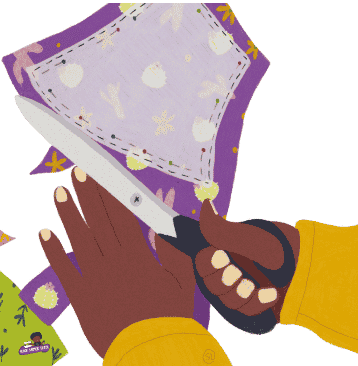Preorder your 2024 BWS Wall Calendar TODAY!
Sign up for the Black Women Stitch quarterly newsletter
Check out our merch here
Leave a BACKSTITCH message and tell us about your favorite episode.
Join the Black Women Stitch Patreon
Check out our Amazon Store
Aaronica B. Cole
Aaronica B. Cole is a dynamic force in the world of sewing and creative expression. With a passion for using thread as a transformative tool, she's known for her audacious approach to style and fashion. Her journey has led her to embrace variegated threads, infusing her creations with unexpected contrasts and vibrant hues. Through her bold designs and unapologetic self-expression, Aaronica challenges norms and inspires others to do the same. Her recent venture into podcasting with the AudaSEWtea Podcast showcases her commitment to amplifying diverse voices and stories in the sewing community. With a genuine warmth and relatable charm, Aaronica brings a fresh perspective to the sewing world, proving that audacity and creativity go hand in hand.
Lisa Woolfork
Lisa Woolfork is an associate professor of English specializing in African American literature and culture. Her teaching and research explore Black women writers, Black identity, trauma theory, and American slavery. She is the founder of Black Women Stitch, the sewing group where Black lives matter. She is also the host/producer of Stitch Please, a weekly audio podcast that centers on Black women, girls, and femmes in sewing. In the summer of 2017, she actively resisted the white supremacist marches in her community, Charlottesville, Virginia. The city became a symbol of lethal resurging white supremacist violence. She remains active in a variety of university and community initiatives, including the Community Engaged Scholars program. She believes in the power of creative liberation.
Insights from this episode:
- How Aaronica's presence has grown and flourished with regards to her career since her last appearance on the podcast three years ago
- The episode focuses on three key aspects of Aaronica's work: her designing ventures, including the Aurifil thread collection and Know Me pattern collection pattern collection, her family sewing endeavors, and her new podcast project with Julian Collins
- Aaronica introduces her Rustic Chic Thread Collection
- The Know Me pattern collection is praised for its representation and inclusivity in fashion design, highlighting the need for more diverse perspectives in the industry
- Discussion of the historical lack of inclusivity in fashion design knowledge systems with an emphasis on the importance of creating designs that cater to a wide range of body types and backgrounds
- Aaronica's new podcast venture, AudaSEWtea co-hosted with Julian, is introduced
- The episode ends with Lisa extending an invitation for Aaronica and Julian to share their podcast journey on a future episode, showing support for their new endeavor
Quotes from the show:
- “The notion that you don't have to be within one color scheme... You can mix and match these contrasting colors to create something that is so beautiful and uniquely you." - Aaronica B. Cole, Stitch Please, Episode #206
- "People think of clothing as something superficial... They don't dig deeper and understand the psychology behind fashion and behind the clothing choices that we make. Imagine walking around and only feeling good enough to wear a sack... as opposed to being able to see your body as being beautiful enough to actually adorn it." - Aaronica B. Cole, Stitch Please, Episode #206
- "I think what I've been thinking a lot about is a lot of the knowledge systems that have been developed for sewing in particular and for fashion by extension, were never made with black bodies in mind, period done. And it is, I think a flaw, a type of little flaw in the industry that started as something small in the 1940s but has never changed." - Lisa Woolfork, Stitch Please, Episode #206
- "And so it's become in my mind malignant. I find it malignant and I find it very negative, right? When we look at size charts, when we look at what proportions are supposed to be, but those were designed by, they looked only at the bodies of white women." - Lisa Woolfork, Stitch Please, Episode #206
- "Why should I look at this mainstream over here when, in fact, I am the mainstream." - Aaronica B. Cole, Stitch Please, Episode #206
- "I think that for too long marginalized people, the process of marginalization requires that we set aside what feels good and right to us because it's not what the majority does but that it's ridiculous. It's kind of like trying to make sure that you can fit in somebody else's clothes, right? We, we make our own clothes because we want things to fit us." - Lisa Woolfork, Stitch Please, Episode #206
- "I'm always talking about possibility models. It is important. It is hard for you to become that which you have never seen and you are visible out in the world doing amazing things and the victory is in the visibility and you have absolutely every right to be." - Lisa Woolfork, Stitch Please, Episode #206
Resources Mentioned:
- Patterns for Pirates
- Bernina (Sewing machine brand)
- Afros & Audio (Organization)
- Black Podcasters Association
- Black Podcast Awards
- Women of Color Podcast (Organization)
Stay Connected:
YouTube: Black Women Stitch
Instagram: Black Women Stitch
Facebook: Stitch Please Podcast
Lisa Woolfork
Instagram: Lisa Woolfork
Twitter: Lisa Woolfork
Aaronica B. Cole
Instagram: Aaronica B. Cole
Youtube: Aaronica B. Cole
Subscribe to our podcast + download each episode on Apple Podcasts and Spotify.
This episode was produced and managed by Podcast Laundry.
Sign up for the Black Women Stitch quarterly newsletter
Check out our merch here
Leave a BACKSTITCH message and tell us about your favorite episode.
Join the Black Women Stitch Patreon
Check out our Amazon Store
Stay Connected:
YouTube: Black Women Stitch
Instagram: Black Women Stitch
Facebook: Stitch Please Podcast



